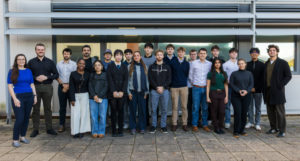National clean energy mission must follow the social science if government is to deliver 2030 policy target and accelerate journey to Net Zero

Credit: Getty Images
New thinking on social and cultural change is required if government is going to reach its net zero target, says a group of independent expert academics.
Technology alone will not be enough. People, our societies and our systems need to change and adapt to meet our net zero goals.
In a report by the ESRC-funded ACCESS network, 10 leading academics call for the government to make more consistent and effective use of social science, to build a more sophisticated understanding of societal change and to plan next steps to achieve net zero ambitions.
The report – Making a Net Zero Society: Follow the Social Science – highlights that net zero will involve social and cultural changes that go beyond economic, supply-side and narrowly framed consumer-based approaches.
Their recommendations include:
- Giving greater attention to UK-wide efforts to reduce how much energy we use.
- Building and communicating positive and collective visions of a net zero future that can galvanise widespread support for net zero changes
- Recognising the many benefits of action beyond reducing emissions, including better health, new jobs, technological innovation and a fairer society
- Empowering mid-level actors and organisations (e.g. local authorities, employers, faith-based groups) to deliver place-sensitive, locally appropriate, net zero interventions.
- Involving people in meaningful debate about the changes required to reach net zero, that acknowledges the challenges as well as the benefits of net zero action.
These recommendations will require more social scientists working across central, devolved and local government to utilise their varied expertise, insight and analytical techniques to support better net zero decision making.
This report includes a review of current government net zero plans and a series of case studies that offer useful insights into successful societal changes e.g. smoking, single-use plastics, and the school streets scheme.
Read the summary and full report here.
Lead author Professor Karen Bickerstaff, from the University of Exeter, said: “This research report provides a clear evidence base for fuller representation of the social sciences within the expert groups advising government on net zero.
“Technology is really important but cannot, in isolation, achieve the deep decarbonisation required; social dynamics and processes must be an equal focus of government initiatives.
“There is great potential to reduce energy demand, but this requires meaningful public debate about the benefits and challenges involved.”
Co-author Gordon Walker, Emeritus Professor at the Lancaster Environment Centre, Lancaster University, said: “Following the science on climate change has long been crucial, but on its own doesn’t make change happen.
“The social sciences have an enormous amount to contribute to finding effective and practical routes to net zero across society.
“There are key principles to follow – working closely with communities, being inclusive, reducing energy dependency, maximising co-benefits – and much insight that social scientists can contribute to diagnosing the successes and failures of policy action.”
Co-author Professor Simone Abram, Executive Director of Durham Energy Institute, Durham University, added: “There is mature and extensive social science evidence on clean energy.
“Government and industry must understand social science insights to avoid repeating the same mistakes and ensure everyone can participate in the energy transition.”
Co-author and Director of ACCESS, Professor Patrick Devine-Wright from the University of Exeter, said: “The report’s final recommendation is that the UK and devolved governments include more social science expertise in science advisory committees looking at net zero.
“One way to do this would be to establish a Net Zero Social Science Advisory Committee within the Department for Energy Security and Net Zero.”
Co-Director of ACCESS, Professor Birgitta Gatersleben, from the University of Surrey, said: “This team of experts clearly shows how social science is essential to guarantee the social transformation needed to achieve net zero targets.”
Professor Julie MacArthur, Canada Research Chair in Reimagining Capitalism, Royal Roads University, endorses the report as “an important change from a business-as-usual focus in net-zero policy on technocentrism.
“It reflects the fact that transitions are as much socio-political – reflecting diverse values, cultures and interests – as they are technological. Two important ways this is represented in the report are: i) how contestation is framed as a necessary, important and expected part of transitions, rather than an unwelcome surprise and ii) the focus on ‘mid-level’ actors at the municipal and community level.”



